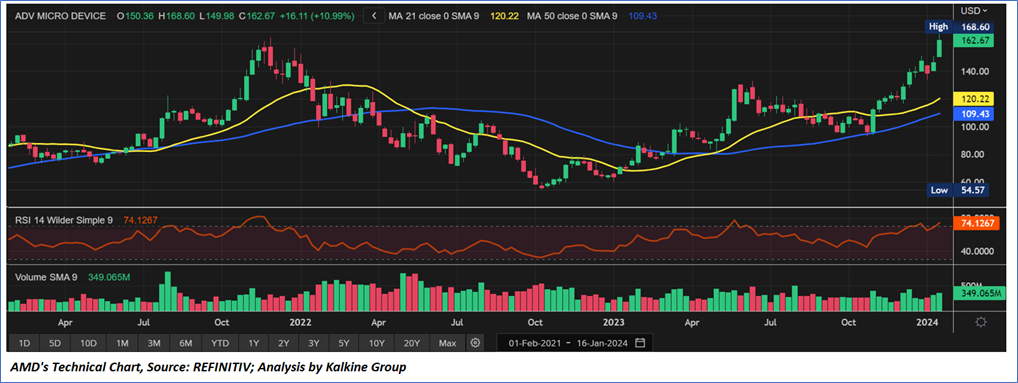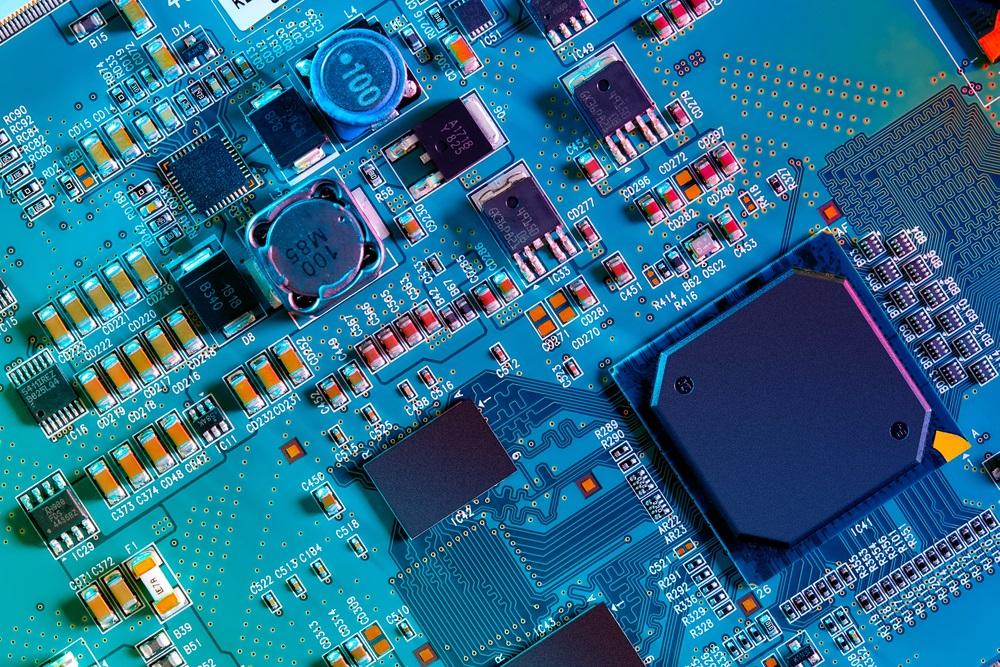Advanced Micro Devices Inc
Advanced Micro Devices, Inc. (NASDAQ: AMD) is a global semiconductor company. The Company operates through four segments: Data Center, Client, Gaming, and Embedded. The Data Center segment includes server central processing units (CPUs) and graphics processing units (GPUs), data processing units (DPUs), field programmable gate arrays (FPGAs) and adaptive system-on-a-chip (SoC) products for data centers. The Client segment includes CPUs, accelerated processing units (APUs) that integrate microprocessors and GPUs (APUs), and chipsets for desktop and notebook personal computers. The Gaming segment includes discrete GPUs, semi-custom SoC products and development services. The Embedded segment, which primarily includes embedded CPUs and GPUs, FPGAs, and adaptive SoC products.

Recent Business Highlights
- On Tuesday, January 30, 2024, after the close of the market, AMD (NASDAQ: AMD) disclosed its intention to release the financial results for the fiscal fourth quarter and full year 2023. Subsequently, at 5:00 p.m. EST / 2:00 p.m. PST, the company's management will host a conference call to deliberate on these results.
- Quarterly Segment Summary: In the Data Center segment, revenue remained consistent year-over-year at USD 1.6 billion, with a sequential increase of 21%, driven by heightened adoption of 4th Gen AMD EPYC CPUs. Meanwhile, AMD Instinct™ MI300A and MI300X GPUs are poised for volume production in the fourth quarter. The Client segment recorded USD 1.5 billion in revenue, a 42% YoY increase propelled by robust Ryzen mobile processor sales, and a sequential growth of 46%, mainly attributed to higher AMD Ryzen™ 7000 Series CPU sales. The Gaming segment, with revenue at USD 1.5 billion, witnessed an 8% YoY decrease due to a decline in semi-custom revenue, partially offset by increased AMD Radeon™ GPU sales. The Embedded segment reported USD 1.2 billion in revenue, a 5% YoY decline, primarily attributable to reduced revenue in the communications market. This segment's revenue also decreased 15% sequentially due to customer inventory adjustments.
- Recent PR Highlights: AMD showcased notable achievements in various segments. In the Data Center arena, the company experienced significant cloud adoption of AMD EPYC processors, introducing nearly 100 new instances from major providers. The company expanded its 4th Gen EPYC CPU portfolio and completed acquisitions of AI software experts Nod.ai and Mipsology, enhancing its AI capabilities. In the gaming sector, AMD introduced high-performance graphics processors, including the flagship laptop GPU, AMD Radeon RX 7900M, and graphics cards like Radeon RX 7800 XT and Radeon RX 7700 XT. Additionally, the company launched FidelityFX™ Super Resolution 3 and the latest version of AMD Software: Adrenalin Edition, offering advanced features for gamers and professionals. The Leadership section highlighted AMD's advancements in adaptive and embedded computing, with products like the Versal AI Edge XQRVE2302 for space-grade applications, AMD Alveo™ UL3524 accelerator card for fintech, and the AMD Kria™ K24 System-on-Module for industrial edge applications.
- Current Outlook: AMD's outlook for the fourth quarter of 2023 anticipates revenue to be around USD 6.1 billion, with a YoY growth of approximately 9% and sequential growth of about 5%. The non-GAAP gross margin is projected to be approximately 51.5%.


Technical Observation (on the daily chart)
The stock broke above an important resistance zone of USD 125-USD130 in December 2023, with the further upward momentum to its all-time high price of USD164.46. The Relative Strength Index (RSI) over a 14-week period stands at oversold level of 74.13, indicating a state of potential consolidation or a short-term correction. Additionally, the stock's current positioning is above both the 21-week Simple Moving Average (SMA) and the 50-week (SMA), which may serve as dynamic support level.
As per the above-mentioned price action, momentum in the stock over the last month, and technical indicators analysis, a ‘Watch’ rating has been given Advanced Micro Devices, Inc. (NASDAQ: AMD) at the closing market price of USD 162.67 as of January 18, 2024.
Individuals can evaluate the stock based on the support and resistance levels provided in the report in case of keen interest taking into consideration the risk-reward scenario.
Markets are trading in a highly volatile zone currently due to certain macro-economic issues and prevailing geopolitical tensions. Therefore, it is prudent to follow a cautious approach while investing.
Related Risk: This report may be looked at from a high-risk perspective and a recommendation is provided for a short duration. This report is solely based on technical parameters, and the fundamental performance of the stocks has not been considered in the decision-making process. Other factors which could impact the stock prices include market risks, regulatory risks, interest rates risks, currency risks, social and political instability risks etc.
How to Read the Charts?
The yellow colour line reflects the 21-period simple moving average (SMA) while the blue line indicates the 50- period simple moving average (SMA). SMA helps to identify existing price trends. If the prices are trading above the 21-period and 50-period moving average, then it shows prices are currently trading in a bullish trend.
The orange colour line in the chart’s lower segment reflects the Relative Strength Index (14-Period) which indicates price momentum and signals momentum in trend. A reading of 70 or above suggests overbought status while a reading of 30 or below suggests an oversold status.
The red and green colour bars in the chart’s lower segment show the volume of the stock. The volume is the number of shares that changed hands during a given day. Stocks with high volumes are more liquid than stocks with lesser volume as liquidity in stocks helps with easier and faster execution of the order.
The Orange colour lines are the trend lines drawn by connecting two or more price points and used for trend identification purposes. The trend line also acts as a line of support and resistance.
Technical Indicators Defined: -
Support: A level at which the stock prices tend to find support if they are falling, and a downtrend may take a pause backed by demand or buying interest. Support 1 refers to the nearby support level for the stock and if the price breaches the level, then Support 2 may act as the crucial support level for the stock.
Resistance: A level at which the stock prices tend to find resistance when they are rising, and an uptrend may take a pause due to profit booking or selling interest. Resistance 1 refers to the nearby resistance level for the stock and if the price surpasses the level, then Resistance 2 may act as the crucial resistance level for the stock.
Stop-loss: It is a level to protect further losses in case of unfavourable movement in the stock prices.
Abbreviations
CMP: Current Market Price
SMA: Simple Moving Average
RSI: Relative Strength Index
USD: United States dollar
Note: Trading decisions require a thorough analysis by individual. Technical reports in general chart out metrics that may be assessed by individuals before any stock evaluation. The above are illustrative analytical factors used for evaluating the stocks; other parameters can be looked at along with additional risks per se. Past performance is neither an indicator nor a guarantee of future performance.
Note 1: Past performance is not a reliable indicator of future performance.
Note 2: The reference date for all price data, currency, technical indicators, support, and resistance level is January 18, 2024. The reference data in this report has been partly sourced from REFINITIV.
Note 3: Investment decisions should be made depending on an individual's appetite for upside potential, risks, holding duration, and any previous holdings. An 'Exit' from the stock can be considered if the Target Price mentioned as per the Valuation and or the technical levels provided has been achieved and is subject to the factors discussed above.
Note 4: Target Price refers to a price level that the stock is expected to reach as per the relative valuation method and or technical analysis taking into consideration both short-term and long-term scenarios.
Note 5: ‘Kalkine reports are prepared based on the stock prices captured either from the New York Stock Exchange (NYSE), NASDAQ Capital Markets (NASDAQ), and or REFINITIV. Typically, all sources (NYSE, NASDAQ, or REFINITIV) may reflect stock prices with a delay which could be a lag of 15-20 minutes. There can be no assurance that future results or events will be consistent with the information provided in the report. The information is subject to change without any prior notice.’
AU




 Please wait processing your request...
Please wait processing your request...